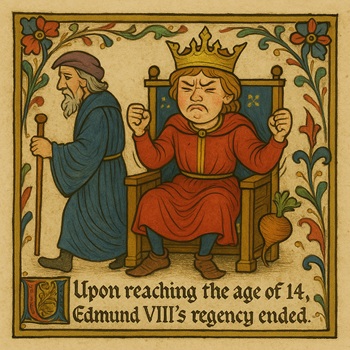To be fair to Duke Cecil Melchett, the philosophy of "Why do anything when you can do nothing and still take credit?'" is one shared by a good many people 
- 1
This has been great so far.









I take it that Edmund VII didn't like sardines and rosé-wines.Edmund VII refused, claiming he'd rather die than set foot in that disgraceful land of sardine-eaters and rosé-wines, and he ordered the fleet to continue sailing straight for Edinburgh. This was his last cunning plan.
I take it that Edmund VII didn't like sardines and rosé-wines.
His reign ended as it had started, insulting as many nations as possible ...a demonstration of what would be his diplomatic skills during his reign: a combination of absolute negligence and a surprising ability to alienate even the most amicable sovereigns.
Baldrick was expecting a Jerusalem artichoke... but he would be happy with a turnip.At least this way he didn't have to bring anyone presents.
Queenie might be been more demanding.Baldrick was expecting a Jerusalem artichoke... but he would be happy with a turnip.
Despite advice to stop in Portugal for treatment, Edmund VII refused, claiming he'd rather die than set foot in that disgraceful land of sardine-eaters and rosé-wines, and he ordered the fleet to continue sailing straight for Edinburgh.
This was indeed the best part of the last chapter and what a fateful decision it turned out to be.I take it that Edmund VII didn't like sardines and rosé-wines.
Yes, as you know, usually chapters cover a monarch each, but next chapter will be regency, as Edmund VIII is only nine months old. Hopefully he will survive to childhood and have his own chapter later on...Will we now see a Blackadder regency?
Well, if I was the Pope, I know which one I'd choose.he finally arrived, only to find the Pope busy with a new hat and uninterested in discussing holy wars with a dull king.
The turnips were all confiscated. It was a matter of religious, military, and national security.Lord Baldrick enjoyed the view - but later realized there were no turnips left for him in Scotland.
So he at least speaks some Greek then? He's better qualified than most!appointed Duke Peter Darling II of Galloway as the new head of espionage; mainly because he once played chess with a Greek.
At least that's better than a lousy t-shirt.CONQUERED JERUSALEM BUT ONLY GOT A MEDIOCRE NICKNAME AND A RUSTY WAR AXE
This sounds quite optimistic ... but a Darling can always surprise us on the most unforeseen ways.Maybe this time he won't get caught.










What happened to Lord Binyamin of Rawa?In a sudden twist, the regency of Scotland passed to Lord Edward Blackadder, a distant cousin of the young king Edmund VIII.
Scratch that...As became a rather unfortunate Scottish tradition, the Spymaster was arrested - once again - in Constantinople
As the ingame message said, the reasons behind the regent change are out of our understanding... Lord Binyamin remained in the Byzantine capital a couple more years trying to learn technology, until he was imprisoned by the Basileus and now sits (or maybe hangs) in a cell within the Theodosian Walls in Constantinople.What happened to Lord Binyamin of Rawa?
Without detracting from the much missed and always loved Chancellor Glitterhoof ...That goose is probably a better knight than everyone else in Scotland.
Best line of this new chapter, although there were several others to consider too.so deceitful he could outfox a fox and sell it back its own tail as a novelty scarf.
I also like the "overripe turnip" imagery in this paragraph, although I think you unintentionally have some repeated lines here that may be worthy of an edit.The army of Scotland, commanded by Lord Stephen Blackadder, was victorious in the battle of Höfn against the armies of Germanic Uprising. Hrolfr, leader of the Germanic Uprising, was swiftly defeated in battle and tossed into the oubliette like an overripe turnip. Left to ponder his poor life choices in the dank darkness, he succumbed a few weeks laterHrolfr, leader of the Germanic Uprising, was swiftly defeated in battle and tossed into the oubliette like an overripe turnip. Left to ponder his poor life choices in the dank darkness, he succumbed a few weeks later, proving that the Scottish oubliette was a good first step to Valhalla.
I forgot that your mods make the regencies end at 14. Really seems too young to rule without a supervisor. 16 seems ridiculously young too, by the way.Upon reaching the age of 14, Edmund VIII's regency ended, and he began his reign unmonitored by any guardian.
